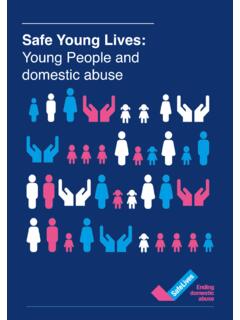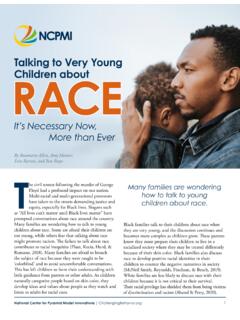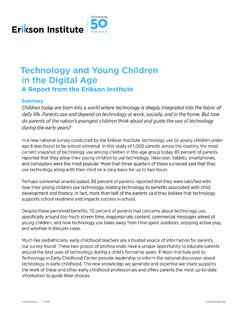Transcription of A NEW PARTNERSHIP WITH FAMILIES
1 THEMATIC REPORT 2. A NEW PARTNERSHIP WITH FAMILIES . Supporting FAMILIES to keep teenagers safe from gangs, exploitation and abuse MARCH 2022. THE COMMISSION ON young LIVES. The Commission on young Lives, launched in September 2021, will propose a new settlement to prevent marginalised children and young people from falling into violence, exploitation and the criminal justice system, and to support them to thrive. Its national action plan will include ambitious practical, affordable proposals that government, councils, police, social services and communities can put into place. We are engaging with those in government and system leaders who have the power to create change, making the case for them to do so.
2 Taking a public health approach focused on prevention, inclusion and supportive relationships, its work is steered by its commissioners, alongside panels of young people and practitioners. The Commission is supported and hosted by Oasis Charitable Trust, a national charity that has been pioneering models of sustainable and holistic community development for 35 years, and now works in over 40 neighbourhoods in England, delivering schools, housing, health and a wide range of other projects with young people and their FAMILIES . The Commission is also funded by the Passion Project Foundation, a charitable social impact aggregator and investor, which brings scaled investment to tackle perennial social problems.
3 Given the subject of this second thematic report is the relationship between family resilience and support and the risks of exploitation, we inevitably focus on the system failures and shortcomings and how these are being tackled. But we also want to champion the excellent work being done and the Commission is grateful to the individuals and organisations who provided examples of existing practice and emerging projects included in this report. We would particularly like to thank those parents and young people who agreed to speak to us and/or share their expertise and often very difficult experiences. Names and some details have been changed to protect people's identity. The authors would also like to thank our practitioners' panel, young Lives Panel, our expert witnesses, and everyone who responded to our call for evidence.
4 We have had 75 detailed responses to date and have drawn on these in this paper and will continue to use these insights in our future reports. Our first thematic report, Out of Harm's Way, focused on teenagers at risk of exploitation, harm, and criminalisation within the care system and on the edge of care', making a series of recommendations, including a new framework for supporting FAMILIES of vulnerable teenagers. Our next report will focus on education, exploring key issues highlighted already, including the experiences of children with special educational needs and the risks facing many who, for one reason or another are not in school (the number of which has risen during the pandemic). The Commission's final action plan, to be published towards the end of the year, will bring all of our themes together, setting out the policy framework and investment needed to support these children and their FAMILIES .
5 This process will build our case for change including invest to save' approaches and will present ambitious practical proposals for what this could look like and how it could be achieved. More information about our work and commissioners is available on our website: Out of Harm's Way: A new care system to protect vulnerable teenagers at risk of exploitation and crime can be found here: FOREWORD. ANNE LONGFIELD CBE, CHAIR OF THE. COMMISSION ON young LIVES. This is the second report to be published by the Criminal justice-led interventions and budgets . Commission on young Lives. Our first report, Out of however important home in on crime reduction, Harm's Way, focused on teenagers at risk of while what is needed are consistent and integrated exploitation, harm and criminalisation within the care welfare-led approaches to teenagers at risk, including system and on the edge of care'.
6 1 Citing evidence far more local authorities embedding contextual around adverse childhood experiences, we showed safeguarding approaches in their leadership and that many problems could have been contained or operational models. avoided. This report further explores some of the kinds of interventions that are needed very early on. We heard how parents are struggling to get the help Some of the parents and young people we spoke to they need when things begin to get out of hand talked powerfully about the impact of lack of support and/or when things reach crisis point: when they find in the early years. Others identified the need for more that burner phone, or unexplained amounts of money, targeted help when children started school, particularly or knives in their children's bedrooms.
7 Some when they had special educational needs and/or were teenagers suddenly start behaving very differently, at risk of dropping out of school or being excluded. spending a lot of time with an unknown group of friends, or long and unpredictable periods of time For most teenagers, including those taken into care, away from home. Some go missing. The NSPCC. their family and extended family is going to be an reported that more children were being groomed important ongoing aspect of their lives. It is something online during While many parents remain that could, with better help, provide the stability and unaware that their child is being targeted, some may support needed to progress. That is why our first notice changes in their mood, friendship group and in report argued for new and creative models of long- device use, including more time being spent online.
8 Term wrap around support for teenagers and their FAMILIES including shared care with FAMILIES , kinship We heard how sometimes parents call the police and care and wider community support to prevent social services desperate for help, only to be told that problems escalating but also for intense interventions this does not exist or to be given ineffective responses that respond when things reach crisis point. These and/or contradictory advice. If children are excluded specific offers for teenagers and their FAMILIES need to or out of school things can often get much worse, as be at the heart of a reformed care system. they lose access to support from teachers and spend more time without structure and supervision.
9 Out of As we acknowledged in Out of Harm's Way, there has Harm's Way showed that referrals to children's social been innovation in this area, including the creation of care services often made by teachers had reduced Violence Reduction Units (VRUs), first developed in since the arrival of school lockdowns, while the drivers Scotland in 2005, and the greater use of contextual of risk were increasing. safeguarding, an approach to understanding and responding to young people's experiences of Some parents described having to become instant significant harm beyond their Despite this, we experts', trying to navigate issues around grooming, showed that trends around these issues are going in exploitation and county lines and access services new the wrong direction.
10 To them. For FAMILIES already struggling, this is more difficult; many have fewer resources and lower levels of confidence and trust in statutory services. 1 Commission on young Lives (2021) Out of Harm's Way: A new care See also the Contextual Safeguarding Network system to protect vulnerable teenagers at risk of exploitation and crime. 2 This approach developed and championed by Dr Carlene Fermin 3 NSPCC (24 August 2021). Record high number of recorded ( ) grooming crimes lead to calls for stronger online safety legislation.. 3. For most of the parents we spoke to it was evident As the House of Lords Public Services Committee set that services are either not geared up to, or have the out in its report into childhood vulnerability last year,4.






